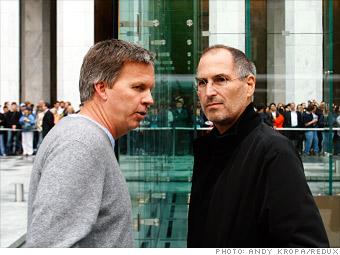Steve Jobs originally envisioned Apple Stores as targeting creative professionals
Even before he had started work at Apple, Johnson was making changes at the company. According to a profile on the executive by Fortune, Jobs told Johnson during a recruiting meeting that he wanted Apple's retail stores to be for creative professionals.
"I said, 'Well, then I'm not coming. If you want to be a store for all Americans, sign me up,'" Johnson recounted in an interview with the publication.
Johnson made a name for himself at Target during the 1990s before being wooed to Apple. Working directly with Jobs, he crafted Apple's retail division into the world's most profitable retailer. Apple Stores average $6,000 in revenue per square foot, compared to $156 at J.C. Penney.
Although Jobs has received a lot of the credit for Apple's retail successes, Johnson played a pivotal behind-the-scenes role at the company.
Ron Johnson and Steve Jobs at Fifth Avenue store opening.
"The reason it worked was Ron," said Michael Kramer, who previously served as Apple Retail's CFO and now works with Johnson as Penney's COO. "Even in the face of bad numbers or challenges, he was always inspiring you."
According to the report, Johnson approached Jobs in September 2000 about the entire approach to Apple's retail stores.
"I think we've got it wrong," he said. "The stores are fundamentally flawed." Johnson argued that the stores shouldn't be organized around individual products and should instead incorporate Apple's idea for a 'digital hub.'
Jobs reacted strongly at first. After all, ground had already been broken on the first location in McLean, Va. "Do you realize how much time I put into designing this store?" he said. After a pause, he conceded, "You might be right, but don't talk about it to the team today."
According to Johnson, Jobs subsequently walked into a team meeting and said, "Ron thinks this store is all wrong, and he's right. We're going to start over.'"
Johnson revealed late last year that he had "reimagined everything" when creating Apple's retail stores. "You have to create a store that's more than a store to people," he said. "People come to the Apple Store for the experience — and they're willing to pay a premium for that."
After more than 10 years at Apple, Johnson announced last June that he was leaving to become CEO at J.C. Penney, thereby fulfilling a lifelong dream of running a retail company. Jobs reportedly responded to the news by disparaging the retailer as "a B- or C company with B- people." At Jobs' behest, Johnson agreed to stay on at Apple until November.
Once at J.C. Penney, Johnson quickly assembled a team of former Apple executives around him at J.C. Penney. In January, he unveiled his plan for the 110-year-old retailer with a full page ad in The Wall Street Journal that proclaimed a goal of becoming consumers' "favorite store."
Johnson turned out to be a tough executive to replace, as Apple spent months searching for his replacement. The company eventually hired John Browett, the CEO at European technology retailer Dixons, as its new head of retail.
 Josh Ong
Josh Ong












 Marko Zivkovic
Marko Zivkovic
 Amber Neely
Amber Neely
 Christine McKee
Christine McKee
 Malcolm Owen
Malcolm Owen
 Mike Wuerthele and Malcolm Owen
Mike Wuerthele and Malcolm Owen

 William Gallagher
William Gallagher








